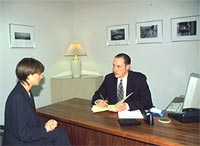 ot an interview coming up? Feeling unprepared, nervous?
ot an interview coming up? Feeling unprepared, nervous?
As nerve-wracking as it might seem, the outcome of a job interview often depends more on your disposition, among other things.
 The good news, though, is that giving interviews is a skill and, just like any other skill, it too can be developed.
The good news, though, is that giving interviews is a skill and, just like any other skill, it too can be developed.
A good way to start developing this skill is to exercise these handy hints.
If you have already been to quite a few, it would be helpful to start the next one afresh without the baggage of past failures, if any.
Here is a step-by-step method to prepare for an interview.
Step 1: Finetune your application strategy
Always remember that an impression of you, based on your resume and job application, has already been formed in the mind of the interviewer even before you walk in for the interview. So, getting your job application right is the first step. Be meticulous at this stage.
~ Spruce up your resume to look good on paper. The quality, content and attitude expressed in the application are judged by the interviewer, based on which the selections would be made.
It is very important that you don't lie. If you are caught lying about anything then the fate of the interview, in all likelihood, would be sealed at that instant itself.
~ Reconfirm that all details are present in the job application in a precise, logical and coherent manner and that they are relevant and match the company's requirements.
~ "In some cases, a flawless resume does more than 70 percent of the work," says Nina Sahoo, executive, HR recruitment, Citibank. Nina goes through many resumes everyday and avows that a well-presented resume, with honest information, increases the chance of the candidate being called for an interview.
~ She advises applicants to take utmost care of the resume's format, spelling errors and the logical flow of personal, academic and professional information.
Bonus tip: If you are certified in any domain, you can also print your resume on a watermark (a paper with a printed background of certification, institution, etc) or on executive bond paper on which the accredited logo is printed. This can make quite an impression.
Step 2: Do your homework
If you are applying for your dream job, a little sleuthing can go a long way. In fact, research relentlessly.
~ Though most companies have an official induction programme where information about the organisation and your responsibilities will be spelt out, try to know as much as possible about the company and the job in advance.
~ Use multiple recourses like the official Web site, newspapers, personal resources in the form of friends, family and acquaintances, etc.
~ A favourite trick of many interviewers on D-day is to ask you specific questions, and there are instances where interviewees lie to make up for their lack of research. So find out everything about the structure of the company, its products, your job responsibilities, etc.
~ "With a zillion interviews happening everyday, it's a mundane process having to explain to the candidate about the company and interview process," says Richa Pillai, who is in charge of the accounts department at Reliance, Sewri.
She mentions a particular candidate who had walked in for the position for an accountant. The candidate made a good impression by explaining the financial reports for the last three years. Needless to say, he immediately got the job.
"Be prepared," says Richa. "Candidates walking in with adequate preparation are a real treat."
Bonus tip: Find out the composition of the interview process, especially whether you are expected to give a written test.
Step 3: Crack the mock interview
Any activity or performance becomes successful or one of quality when the activist or the performer rehearses several times.
~ Practising dummy interviews along with a friend will give you valuable feedback on what you may be doing right and where you may need to tweak your skills.
Instruct your friend to watch out for, and give a candid opinion about, your speech, delivery, body language, quality of answers, diction, etc.
~ If, at the last moment, you are unsure about the feedback, go with your instincts.
Mock interviews serve to increase your confidence level and keep you prepared for the most unexpected questions.
~ In absence of a friend/ relative, the traditional method of looking into the mirror and practising would still hold good, except that you would have get into the shoes of both the interviewer and the interviewee.
Step 4: Make a good first impression
~ The mantra 'Look good, feel confident' works especially well with interviews. So spruce up your appearance, dress in accordance with the company dress code or according to the diktats of your profession.
It is safer to be overdressed so, if you have no clue about the company's dress code, then dress formally.
~ Reach well in advance for the interview and manage your disposition from that point on.
~ Don't let fellow interviewees intimidate you in any manner. Maintain an 'I am the best' attitude. However, don't forget to stay humble.
~ Keep all necessary documents handy. Don't shuffle and fidget during the interview. Avoid carrying documents in an envelope as it will take time to show them to the interviewers.
Arrange the documents in a folder and present them in the order that has been asked. Remember to collect all the certificates given for perusal after the interview, says Richa Pillai.
~ Keep a pen in your pocket and, yes, ensure it works.
Bonus tip: If you anticipate that the interview process will go on for the entire day, carry some snacks and bottle of water, suggests Shweta Rathor, an HR executive at a BPO.
Step 5: Tackle the tests
Tests are often a part of the shortlisting process.
For instance a technical test may be designed to check your technical knowledge. A copy test is a good way to judge your writing/ editing skills. Aptitude/ psychometric tests are designed to check your aptitude, soft skills, etc.
~ "Find out the exact nature of the written tests you are expected to take," says Vikas Prabhu, general manager, IT, Reliance Petroleum.
~ If the tests come as a surprise, they could affect your performance and give a critical jolt to your mental balance, thereby affecting your performance in the rest of the selection process.
Bonus tip: These tests are crucial. An above-average performance in the tests is imperative, says Prabhu.
Next: Top mantras for interview D-day








